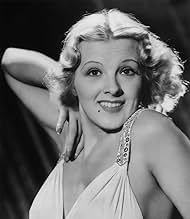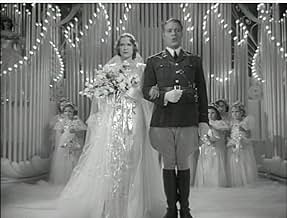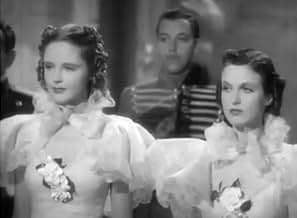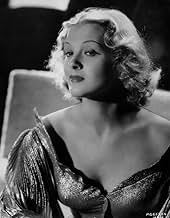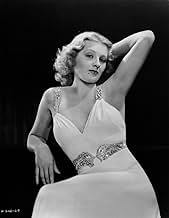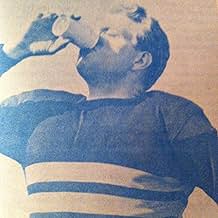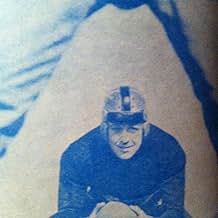IMDb-BEWERTUNG
6,0/10
626
IHRE BEWERTUNG
Füge eine Handlung in deiner Sprache hinzuWest Point cadet Dick Thorpe falls in love with a girl, who turns out to be a princess from an European kingdom.West Point cadet Dick Thorpe falls in love with a girl, who turns out to be a princess from an European kingdom.West Point cadet Dick Thorpe falls in love with a girl, who turns out to be a princess from an European kingdom.
- Auszeichnungen
- 1 wins total
Carol Adams
- Dancer
- (Nicht genannt)
Kay Aldridge
- Lady in Waiting
- (Nicht genannt)
Empfohlene Bewertungen
West Point cadet Dick (Nelson Eddy) falls for foreign princess Rosalie (Eleanor Powell). He doesn't know she's a princess, though (they never do in movies). Rosalie is called back to her country to marry another guy. Dick follows along to win her heart. When he finds out who she is and that she's engaged, he heads back to America. Then the movie ends with everybody miserable. Just kidding.
36 year-old Nelson Eddy as a West Point cadet is a stretch but we'll overlook that. He does fine and better than fine when singing. Eleanor Powell smiles her way through the whole picture but it's such a pretty smile that I doubt anybody minds. There's some funny parts, such as the airport guys and the ventriloquist bits. Great supporting cast includes Edna May Oliver, George Zucco, Virginia Grey, Reginald Owen, and future Oz costars Ray Bolger and Frank Morgan. Thickly-accented Ilona Massey plays Powell's friend. She's lovely to look at but hard to understand. With a cast like this and such good production values, it really should have been a classic. Unfortunately, there are some problems with it. For one, it's overlong. A movie with such a banal plot has no business being over two hours long. Also, the two leads have little romantic chemistry. They're both likable but there's just no spark.
It's a musical with Nelson Eddy and Eleanor Powell so, it stands to reason, most of us will watch for the singing and dancing. The Cole Porter songs are sung well. "In the Still of the Night" is the stand-out tune. As is usually the case with her movies, Powell's dancing is the highlight of the film. She gets three tap numbers, including an impressive routine on big drums. All three numbers are fantastic. Watching Powell dance is always a treat and you should watch the movie for that, if nothing else.
36 year-old Nelson Eddy as a West Point cadet is a stretch but we'll overlook that. He does fine and better than fine when singing. Eleanor Powell smiles her way through the whole picture but it's such a pretty smile that I doubt anybody minds. There's some funny parts, such as the airport guys and the ventriloquist bits. Great supporting cast includes Edna May Oliver, George Zucco, Virginia Grey, Reginald Owen, and future Oz costars Ray Bolger and Frank Morgan. Thickly-accented Ilona Massey plays Powell's friend. She's lovely to look at but hard to understand. With a cast like this and such good production values, it really should have been a classic. Unfortunately, there are some problems with it. For one, it's overlong. A movie with such a banal plot has no business being over two hours long. Also, the two leads have little romantic chemistry. They're both likable but there's just no spark.
It's a musical with Nelson Eddy and Eleanor Powell so, it stands to reason, most of us will watch for the singing and dancing. The Cole Porter songs are sung well. "In the Still of the Night" is the stand-out tune. As is usually the case with her movies, Powell's dancing is the highlight of the film. She gets three tap numbers, including an impressive routine on big drums. All three numbers are fantastic. Watching Powell dance is always a treat and you should watch the movie for that, if nothing else.
The film has two Cole Porter songs -- "Rosalie" and "In the Still of the Night." For several bars of the latter, we see the back of Nelson Eddy as he sings to the back of Eleanor Powell. This daring shot is superb, because we can feel the effect of the song on both. Eddy is stiff, except when he sings. That stiffness is partly in the role as West Point cadet, but it's mostly Nelson. Powell has a great production number in her native Romanza, to which the unsuspecting Eddy has pursued her. Powell's best moments, though, occur as she commands a crack West Point drill team to the strains of "The Stars and Stripes Forever." The Souza march changes from 4/4 to waltz time for a Powell solo. The drill is an imaginative sequence that takes advantage of Powell's incredible skills. After all these years, you still say "Wow!" Frank Morgan is endearing as a king with an eye for the girls, while Edna May Oliver is completely convincing as his forever-angry wife. A couple of good moments occur when Morgan's puppet insults the Queen, speaking, as it were, for its puppeteer. Ray Bolger is completely wasted as Eddy's friend and Billy Gilbert's scenes, in which he sneezes over all bystanders, should have tasted the cutting room floor. But for its several great moments, this one is worth watching.
Eleanor Powell stars with Nelson Eddy, Ray Bolger, Edna May Oliver, and Frank Morgan in "Rosalie" from 1937.
The original music by Romberg and Gershwin was scrapped, and a new score was written by Cole Porter, which is very nice with the title song and "In the Still of the Night" the major songs that come out of it.
The plot is nothing unusual. A Princess (Powell) comes to America, where she hides her identity. She falls for a football playing cadet Dick Thorpe (Nelson Eddy, probably 15 years too old). Then she has to return to her country, Romanza, where she is betrothed to another. Dick follows her there along with his friend Bill (Bolger) whose girlfriend has dumped him.
I have to say that for me, this was Nelson Eddy's best singing - he showed more of his higher range and also demonstrated the ability to sing a high tessitura - I'm not trying to be a snob, that just means that even if music is consistently high, he can sing it. Not everyone can. This movie really made me wonder if there might have been a heldentenor lurking there someplace. Acting-wise he was pretty wooden. I never cared, not with that voice.
Eleanor Powell was delightful, both in her acting and great dancing.
Edna May Oliver is the domineering queen and Morgan is the bumbling King. Truthfully I really only was interested in the singing and dancing. And there was plenty of it, and some amazing sets.
The original music by Romberg and Gershwin was scrapped, and a new score was written by Cole Porter, which is very nice with the title song and "In the Still of the Night" the major songs that come out of it.
The plot is nothing unusual. A Princess (Powell) comes to America, where she hides her identity. She falls for a football playing cadet Dick Thorpe (Nelson Eddy, probably 15 years too old). Then she has to return to her country, Romanza, where she is betrothed to another. Dick follows her there along with his friend Bill (Bolger) whose girlfriend has dumped him.
I have to say that for me, this was Nelson Eddy's best singing - he showed more of his higher range and also demonstrated the ability to sing a high tessitura - I'm not trying to be a snob, that just means that even if music is consistently high, he can sing it. Not everyone can. This movie really made me wonder if there might have been a heldentenor lurking there someplace. Acting-wise he was pretty wooden. I never cared, not with that voice.
Eleanor Powell was delightful, both in her acting and great dancing.
Edna May Oliver is the domineering queen and Morgan is the bumbling King. Truthfully I really only was interested in the singing and dancing. And there was plenty of it, and some amazing sets.
5B24
Writing comments about a movie like this one is difficult. The plot and dialogue are atrocious, but the score and visuals are first rate. So one splits the difference and gives it a "5." As some of the few comments thus far have implied, it is a formulaic comedy with loads of prominent character actors of the time reprising roles already played in other movies and on the radio. Audiences in 1937 were for the most part captive to that sort of thing. Diversity of tastes like that of today just did not exist, and everyone going to the movies in small-town America was inclined to go along with the gag mainly because it was literally the only show in town.
When as a lad I paid my 9 cents admission at the box office, I knew I was going to sit through anything they threw at me, including the newsreel at the beginning, the same old cartoons, a dumb serial episode with someone falling off a moving train at the end -- to be continued -- and a main feature in black-and-white that depended more on stock characters and situations than on anything new or scandalous.
Now I watch these same features on Turner Classic Movies with moody nostalgia and total suspension of disbelief. So what if Nelson Eddy at nearly 40 was playing a cadet of half that age? And what about my now knowing that his off-screen person was 180 degrees off the roles he played? His singing is still mesmerizing, an operetta voice the likes of which disappeared ages ago -- indeed a relic of the Nineteenth Century. Even an uncharacteristically inferior Porter tune like "Rosalie" gets a high-class treatment.
Sure, there are better musicals from the 30's, but this one is a piece of history as well as a minor work of art.
When as a lad I paid my 9 cents admission at the box office, I knew I was going to sit through anything they threw at me, including the newsreel at the beginning, the same old cartoons, a dumb serial episode with someone falling off a moving train at the end -- to be continued -- and a main feature in black-and-white that depended more on stock characters and situations than on anything new or scandalous.
Now I watch these same features on Turner Classic Movies with moody nostalgia and total suspension of disbelief. So what if Nelson Eddy at nearly 40 was playing a cadet of half that age? And what about my now knowing that his off-screen person was 180 degrees off the roles he played? His singing is still mesmerizing, an operetta voice the likes of which disappeared ages ago -- indeed a relic of the Nineteenth Century. Even an uncharacteristically inferior Porter tune like "Rosalie" gets a high-class treatment.
Sure, there are better musicals from the 30's, but this one is a piece of history as well as a minor work of art.
The first half of this classic movie musical is good. The second half was a big disappointment.
The first half is interesting with likable characters and a couple of good song- and-dance numbers. The second half features a sappy romance and drags on too long.
Frank Morgan doesn't help things. His "bumbling king" character simply gets irritating after awhile. Eleanor Powell is miscast as a romantic "princess" lead. She just isn't that pretty or convincing as an actress. As everyone knows, she was a far better dancer than an actor
Nelson Eddy's singing is okay but, boy, does it sound corny and dated nowadays. Ray Bolger's comedy isn't funny; it's stupid.
On the positive side, some of the elaborate Busby Berkeley-type dance sets are elaborate and astounding. It's amazing to view. Powell's tap dancing is always entertaining, although I've seen better numbers from her in the Broadway Melody series.
The first half is interesting with likable characters and a couple of good song- and-dance numbers. The second half features a sappy romance and drags on too long.
Frank Morgan doesn't help things. His "bumbling king" character simply gets irritating after awhile. Eleanor Powell is miscast as a romantic "princess" lead. She just isn't that pretty or convincing as an actress. As everyone knows, she was a far better dancer than an actor
Nelson Eddy's singing is okay but, boy, does it sound corny and dated nowadays. Ray Bolger's comedy isn't funny; it's stupid.
On the positive side, some of the elaborate Busby Berkeley-type dance sets are elaborate and astounding. It's amazing to view. Powell's tap dancing is always entertaining, although I've seen better numbers from her in the Broadway Melody series.
Wusstest du schon
- WissenswertesThe singing voice of Eleanor Powell was dubbed by Marjorie Lane (uncredited).
- PatzerDuring the 'drum dance' sequence there are three rows of huge drums all sounding together. The drum sticks on the front row are synchronized so that they all hit the drum at the same time. The drum sticks in the second and third rows are out of synch with the first row yet their sound is in synch.
- VerbindungenEdited into Hollywood: The Dream Factory (1972)
- SoundtracksRosalie
(1937) (uncredited)
Written by Cole Porter
Played during the opening credits and as background music often
Sung by Nelson Eddy
Danced by Eleanor Powell on a set of giant drums at the festival
Reprised by Nelson Eddy at the end
Top-Auswahl
Melde dich zum Bewerten an und greife auf die Watchlist für personalisierte Empfehlungen zu.
- How long is Rosalie?Powered by Alexa
Details
Box Office
- Budget
- 2.000.000 $ (geschätzt)
- Laufzeit
- 2 Std. 3 Min.(123 min)
- Farbe
- Seitenverhältnis
- 1.37 : 1
Zu dieser Seite beitragen
Bearbeitung vorschlagen oder fehlenden Inhalt hinzufügen


